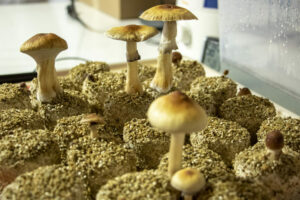Understanding the Legal Landscape: Magic Mushroom Cultivation Laws in Canada
- January 30, 2024
- 1:44 am

Notable Elements
Psilocybin Classification: In Canada, psilocybin, found in magic mushrooms, is classified as a Schedule III controlled substance under the CDSA. Unauthorized possession, production, and trafficking are illegal.
Cultivation Loophole: There’s a legal gray area in Canada regarding the cultivation of magic mushrooms. While spores and mycelium are legal, their cultivation into psilocybin-containing mushrooms is not.
Legal Risks for Cultivators: Cultivating magic mushrooms can lead to serious legal consequences, including fines and imprisonment. The penalties vary based on the scale and intent of cultivation.
Therapeutic Use Exemptions: Health Canada grants exemptions for psilocybin use in specific medical contexts, indicating a shift towards recognizing its medicinal value.
Psilocybin Research: Research into psilocybin’s benefits for mental health is legal under specific licenses and exemptions in Canada, showcasing its potential therapeutic uses.
Advocacy for Reform: Advocacy groups are campaigning for the reevaluation of magic mushroom laws in Canada, aiming for legal access to psilocybin for therapeutic purposes.
Global Decriminalization Trends: There’s a global movement towards decriminalizing or legalizing psilocybin mushrooms, potentially influencing future Canadian laws.
Importance of Legal Awareness: Enthusiasts must stay informed about the legal landscape to avoid unintended legal consequences.
Safety and Responsibility: It’s vital to prioritize safety and informed decisions when exploring magic mushrooms.
Impact of Public Perception: Increasing public awareness and changing perceptions could influence future legislative changes regarding magic mushrooms in Canada.
Balancing Multiple Aspects: The legal landscape of magic mushroom cultivation in Canada is a complex interplay of laws, scientific research, and societal attitudes, requiring careful navigation and understanding.
Introduction
Canada’s approach to the cultivation and use of magic mushrooms, particularly those containing the psychoactive compound psilocybin, has been a topic of increasing interest and debate. In this comprehensive guide, we’ll delve into the current legal landscape surrounding magic mushroom cultivation in Canada, examining the nuances of the law and its implications for enthusiasts and researchers alike.
The Current State of Magic Mushroom Laws in Canada
Psilocybin and Canadian Law
Magic mushrooms, known scientifically as Psilocybe species, contain psilocybin, a Schedule III controlled substance under the Canadian Controlled Drugs and Substances Act (CDSA). This classification makes the unauthorized possession, production, and trafficking of psilocybin illegal. However, the law is more complex when it comes to the cultivation of magic mushrooms.

Cultivation and Legal Gray Areas
The cultivation of magic mushrooms in Canada falls into a legal gray area. While the mushrooms themselves are controlled substances, the spores and mycelium do not contain psilocybin until they mature. This technicality creates a loophole where selling and buying spores for “educational purposes” or “microscopy use” often occurs within legal boundaries, but the cultivation of these spores into mature, psilocybin-containing mushrooms is illegal.
Understanding the Risks and Penalties
Penalties for Illegal Cultivation
Cultivating magic mushrooms for psilocybin can lead to serious legal consequences, including fines and imprisonment. The severity of the penalty depends on various factors such as the scale of cultivation and intent (personal use vs. trafficking). It’s crucial for cultivators to understand these risks fully.
Therapeutic Use and Legal Exemptions
Psilocybin Therapy and Legal Exemptions
In recent years, there has been a growing interest in the therapeutic potential of psilocybin. Recognizing this, Health Canada has started granting exemptions for the use of psilocybin in end-of-life therapy and other medical contexts under Section 56 of the CDSA. This development indicates a shift towards acknowledging the medicinal value of psilocybin.
Research and Development
Canadian researchers are actively studying the potential benefits of psilocybin in treating various mental health conditions. While these studies are legal under specific licenses and exemptions, they represent a small, regulated facet of psilocybin use.
Advocacy and the Future of Psilocybin Laws
Push for Legal Reform
Advocacy groups in Canada are actively campaigning for the reevaluation of magic mushroom laws, citing their therapeutic potential and low risk of harm. These groups hope to see a future where psilocybin can be accessed safely and legally for therapeutic purposes.
Global Trends and Canada’s Position
Globally, there’s a growing movement to decriminalize or legalize psilocybin mushrooms. As this trend continues, Canada’s laws may evolve, potentially leading to more permissive regulations surrounding the cultivation and use of magic mushrooms.
Practical Advice for Magic Mushroom Enthusiasts
Navigating the Legal Landscape
For those interested in magic mushrooms, it’s crucial to stay informed about the law. Engaging in cultivation or use without understanding the legal implications can lead to unintended consequences.
Also Read : Navigating the Legal Landscape: Magic Mushrooms and the Law
Safe and Responsible Practices
While exploring the world of magic mushrooms, prioritize safety and responsibility. This means understanding the risks, both legal and health-related, and making informed decisions.

Legal Implications for Cultivators and Researchers
Cultivator’s Responsibility
Individuals considering the cultivation of magic mushrooms must be acutely aware of their legal responsibilities. While the act of cultivating per se is not explicitly mentioned in the CDSA, any activities leading to the production of psilocybin-containing mushrooms could be deemed illegal. Cultivators should therefore exercise extreme caution and stay abreast of any legal changes.
Research Licensing
For researchers, obtaining a license to study psilocybin and magic mushrooms is a stringent process, regulated by Health Canada. These licenses are typically granted for specific scientific or medical research purposes and require thorough documentation and compliance with numerous regulations.
Educational and Awareness Efforts
Role of Education in Reform
Educational efforts play a crucial role in informing the public and policymakers about the potential benefits and risks associated with magic mushrooms. By increasing awareness, advocates and educators can foster a more informed dialogue about future legal reforms.
Public Perception and Policy
Public perception significantly influences policy-making. As more Canadians become informed about the potential therapeutic uses and relatively low risks of magic mushrooms, public opinion could shift, potentially leading to changes in legislation.
Final Thoughts: Balancing Law, Science, and Society
The cultivation and use of magic mushrooms in Canada present a unique challenge, balancing legal restrictions, scientific inquiry, and societal attitudes. As research continues to unveil the potential benefits of psilocybin, and advocacy groups push for reform, Canada’s legal stance on magic mushrooms may evolve. This evolution could lead to a more progressive and health-oriented approach, reflecting a broader shift in how society perceives and regulates psychoactive substances. For now, understanding and navigating the current legal landscape remains crucial for anyone interested in this fascinating and evolving field.

Hi! I’m Jacob Hawthorne, a passionate medical student dedicated to exploring the fascinating world of psychedelics, particularly magic mushrooms (commonly known as shrooms). With a deep interest in their therapeutic potential and profound effects on the human mind, I aim to provide accurate and evidence-based information about shrooms in the Canadian context.
